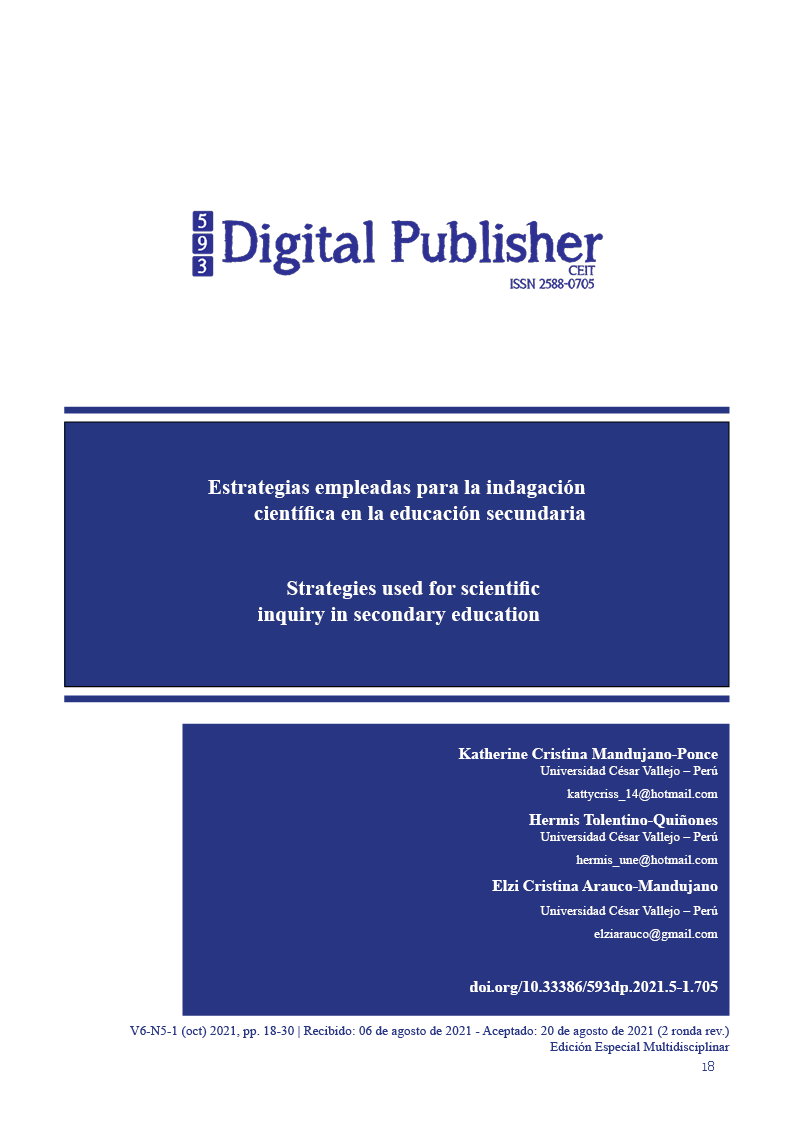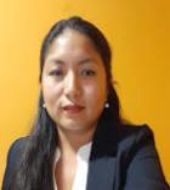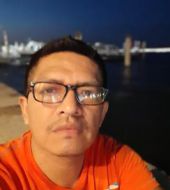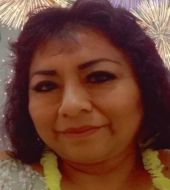Strategies used for scientific inquiry in secondary education
Main Article Content
Abstract
The COVID-19 pandemic has shown that what is most needed in the world is to do research and for this it is important to train future researchers from the first years of training, for this reason, this article aims to recognize and to analyze the strategies used by secondary school teachers in regular basic education (EBR) to develop scientific inquiry in the classroom. The research was carried out in two public schools in Lima, Peru; the methodology used is of constructivist paradigm, under a qualitative approach with phenomenological-hermeneutic design; it was taken as a non-probabilistic and intentional sample to seven teachers of the area of science and technology at the secondary level and 2 coordinators of the area of sciences, the instrument that was used for the collection of information was the semi-structured interview. It was concluded that science and technology teachers know the strategies for the student to achieve the development of scientific inquiry and put it into practice in class, guided by the steps of the scientific method to carry it out; however, there are limitations that become more evident in students in the context of the pandemic because they do not have autonomous learning, so it is suggested that the development of scientific inquiry should take place with more incidence at levels below secondary education in this way have a more solid basis.
Downloads
Article Details

This work is licensed under a Creative Commons Attribution-NonCommercial-ShareAlike 4.0 International License.
1. Derechos de autor
Las obras que se publican en 593 Digital Publisher CEIT están sujetas a los siguientes términos:
1.1. 593 Digital Publisher CEIT, conserva los derechos patrimoniales (copyright) de las obras publicadas, favorece y permite la reutilización de las mismas bajo la licencia Licencia Creative Commons 4.0 de Reconocimiento-NoComercial-CompartirIgual 4.0, por lo cual se pueden copiar, usar, difundir, transmitir y exponer públicamente, siempre que:
1.1.a. Se cite la autoría y fuente original de su publicación (revista, editorial, URL).
1.1.b. No se usen para fines comerciales u onerosos.
1.1.c. Se mencione la existencia y especificaciones de esta licencia de uso.
References
Bernal, C. A. (2010). Metodología de la investigación (Pearson Ed). https://abacoenred.com/wp-content/uploads/2019/02/El-proyecto-de-investigación-F.G.-Arias-2012-pdf.pdf
Camacho, H., Casilla, D., & Finol de Franco, M. (2008). La indagación: una estrategia innovadora para el aprendizaje de procesos de investigación. Laurus, 14(26), 284–306. https://www.redalyc.org/articulo.oa?id=76111491014
Canto, J., & Serrrano, N. (2017). ¿Cuales con los principales problemas para hacer presentes las ciencias en las aulas De educación infantil?: La visión de los maestros en ejercicio. X Congreso Internacional Sobre Investigación En Didáctica de Las Ciencias, 1(Extraordinario), 1995–2000.
Carrascosa-Alís, J., & Domínguez-Sales, C. (2017). Problemas que dificultan una mejor utilización de la Didáctica de las Ciencias en la formación del profesorado y en la Enseñanza Secundaria. Revista Científica, 3(30), 167–180. https://doi.org/10.14483/23448350.12289
Casanova, I., Canquiz, L., & Mendoza, M. (2020a). Desafíos de la emergencia sanitaria ante la formación en investigación. Revista Internacional de Filosofía y Teoría Social, 25(8), 248–259. https://doi.org/10.5281/zenodo.4087481
Casanova, I., Canquiz, L., & Mendoza, M. (2020b). Desafíos de la emergencia sanitaria ante la formación en investigación. Revista Internacional de Filosofía y Teoría Social, 25(8), 248–259. https://doi.org/http://doi.org/10.5281/zenodo.4087481
Coll, C., Martín, E., Mauri, T., Miras, M., Onrubia, J., Solé, I., & Zabala, A. (1999). El constructivismo en el aula (Novena). http://www.terras.edu.ar/jornadas/119/biblio/79Los-profesores-y-la-concepcion.pdf
CONCYTEC. (2017). Primer censo revela baja inversión en investigación y desarrollo en el Perú. https://portal.concytec.gob.pe/index.php/noticias/1051-primer-censo-revela-baja-inversion-en-investigacion-y-desarrollo-en-el-peru
Council National Research. (1996). National Science Education Standards. In National Science Standards. https://doi.org/10.17226/4962
Cristobal, C., & García, H. (2013). La indagación científica para la enseñanza de las ciencias. Horizonte de La Ciencia, 3(5), 99–104. https://doi.org/10.26490/uncp.horizonteciencia.2013.5.81
Delors, J., Al Mufti, I., Amagi, I., Carneiro, R., Chung, F., Geremek, B., Gorham, W., Kornhauser, A., Manley, M., Padrón, M., Sanavé, M., Singh, K., Stavenhagen, R., Won, M., & Nanzhao, Z. (1996). La educación encierra un tesoro: Informe a la UNESCO de la Comisión Internacional sobre la educación para el siglo XXI. (UNESCO).
Dewey, J. (1916). Method in science teaching. General Science Quarterly, 1(1), 3–9. https://doi.org/10.1002/sce.3730010101
Dewey, J. (1965). La relación teórica práctica en educación (Losada).
Dulsat-Ortiz, C. (2019). Microenseñanza en el laboratorio de ciencias para el alumnado del grado de educación infantil. Revista Científica, 3(36), 367–380. https://doi.org/10.14483/23448350.14769
Eugenio-Gozalbo, M., Aragón, L., Vicente, J., & Jiménez-Tenorio, N. (2019). Análisis de las experiencias de aprendizaje de las ciencias de los/as maestros/as de Educación Infantil y Primaria en formación inicial a través de sus relatos de vida. Didáctica de Las Ciencias Experimentales y Sociales, 1(37), 107–126. https://doi.org/10.7203/dces.37.14303
Fuentes-Delgado, D., Minaya, G., & Angulo-Bazán, Y. (2020). Rol de los comités de ética en investigación durante la pandemia por COVID-19. Acta Med Perú, 37(2), 236–238. https://doi.org//10.35663/ amp.2020.372.954
González-Weil, C., Cortéz, M., Bravo, P., Ibaceta, Y., Cuevas, K., Quiñones, P., Maturana, J., & Abarca, A. (2012). La indagación científica como enfoque pedagógico: Estudio sobre las prácticas innovadoras de docentes de ciencia en EM (Región de Valparaíso). Estudios Pedagogicos (Valdivia), 38(2), 85–102. https://doi.org/10.4067/S0718-07052012000200006
Hernández-Sampieri, R., & Mendoza, C. (2018). Metodología de la investigación: las tres rutas cuantitativa, cualitativa y mixta (Mc. GRAW-). http://www.mhhe.com/latam/sampieri_mi1e
IANAS. (2017). Educación en ciencias basada en la indagación : promoviendo cambios en las américas (IANAS). https://ianas.org/wp-content/uploads/2020/07/seb02.pdf
Klimavicius, S. (2007). La curiosidd de los alumnos en las clases de ciencias biológicas. Cuadernos de Investigación Educativa, 2(14), 51–69. http://www.redalyc.org/articulo.oa?id=443643887003
Minedu. (2016). Currículo Nacional de la Educación Básica (Minedu).
Moquillaza, V. (2019). Producción científica asociada al gasto e inversión en investigación en universidades peruanas. An Fac Med., 80(1), 56–59. https://doi.org/10.15381/anales.v80i1.15626
Moquillaza, V. H., & Nuñez, M. J. (2018). Producción científica de las universidades peruanas en temas de salud durante los años 2014 y 2015. Horizonte Médico (Lima), 18(4), 70–74. https://doi.org/10.24265/horizmed.2018.v18n4.10
Muñoz-Campos, V., Franco-Mariscal, A. J., & Blanco-López, Á. (2020). Integración de prácticas científicas de argumentación, indagación y modelización en un contexto de la vida diaria. Valoraciones de estudiantes de secundaria. Revista Eureka Sobre Enseñanza y Divulgación de Las Ciencias, 17(3), 1–17. https://doi.org/10.25267/rev_eureka_ensen_divulg_cienc.2020.v17.i3.3201
Murillo, H. (2010). Misión del docente: propiciar en el estudiante aprendizajes significativos. Enfermería Universitaria, 7(4), 42–52. https://doi.org/10.22201/eneo.23958421e.2010.4.289
Novak, A. (1964). Scientific inquiry (Bioscience).
Ortiz, G., & Cervantes, M. (2015). La formación científica en los primeros años de escolaridad. Panorama, 9(17), 10–23. https://doi.org/10.15765/pnrm.v9i17.788
Purizaca-Rosillo, N., Cardoza-Jiménez, K., & Herrera-Añazco, P. (2016). Producción científica en una universidad pública peruana beneficiaria del canon. An Fac Med., 77(1), 73–74. https://doi.org/http://dx.doi.org/10.15381/anales.v77i1.11561
Ramos, C. A. (2015). Los paradigmas de la investigación científica. Avances En Psicología, 23(1), 9–17. https://doi.org/10.33539/avpsicol.2015.v23n1.167
Reyes-Cárdenas, F., & Padilla, K. (2012). La indagación y la enseñanza de las ciencias. Educación Química, 23(4), 415–421.
Romero-Ariza, M. (2017). El aprendizaje por indagación ¿existen suficientes evidencias sobres sus beneficios en la enseñanza de las ciencias? Revista Eureka Sobre Enseñanza y Divulgación de Las Ciencias, 14(2), 286–299. https://doi.org/10.2526/1169
Sandoval, C. (2002). Investigación cualitativa (ARFO). https://doi.org/10.2307/j.ctt1s4747b.9
Schleicher, A. (2019). PISA 2018: insights and interpretations. https://www.oecd.org/pisa/PISA 2018 Insights and Interpretations FINAL PDF.pdf
Schwab, J. (1966). The teaching of science (Harvard Un).
Toma, R., Greca, I., & Meneses-Villagrá, J. (2017). Dificultades de maestros en formación inicial para diseñar unidades didácticas usando la metodología de indagación. Revista Eureka Sobre Enseñanza y Divulgación de Las Ciencias, 14(2), 442–457. https://doi.org/10.25267/rev_eureka_ensen_divulg_cienc.2017.v14.i2.11
UMC. (2019). Evaluación PISA 2018. In Minedu (Vol. 1). http://umc.minedu.gob.pe/resultadospisa2018/




